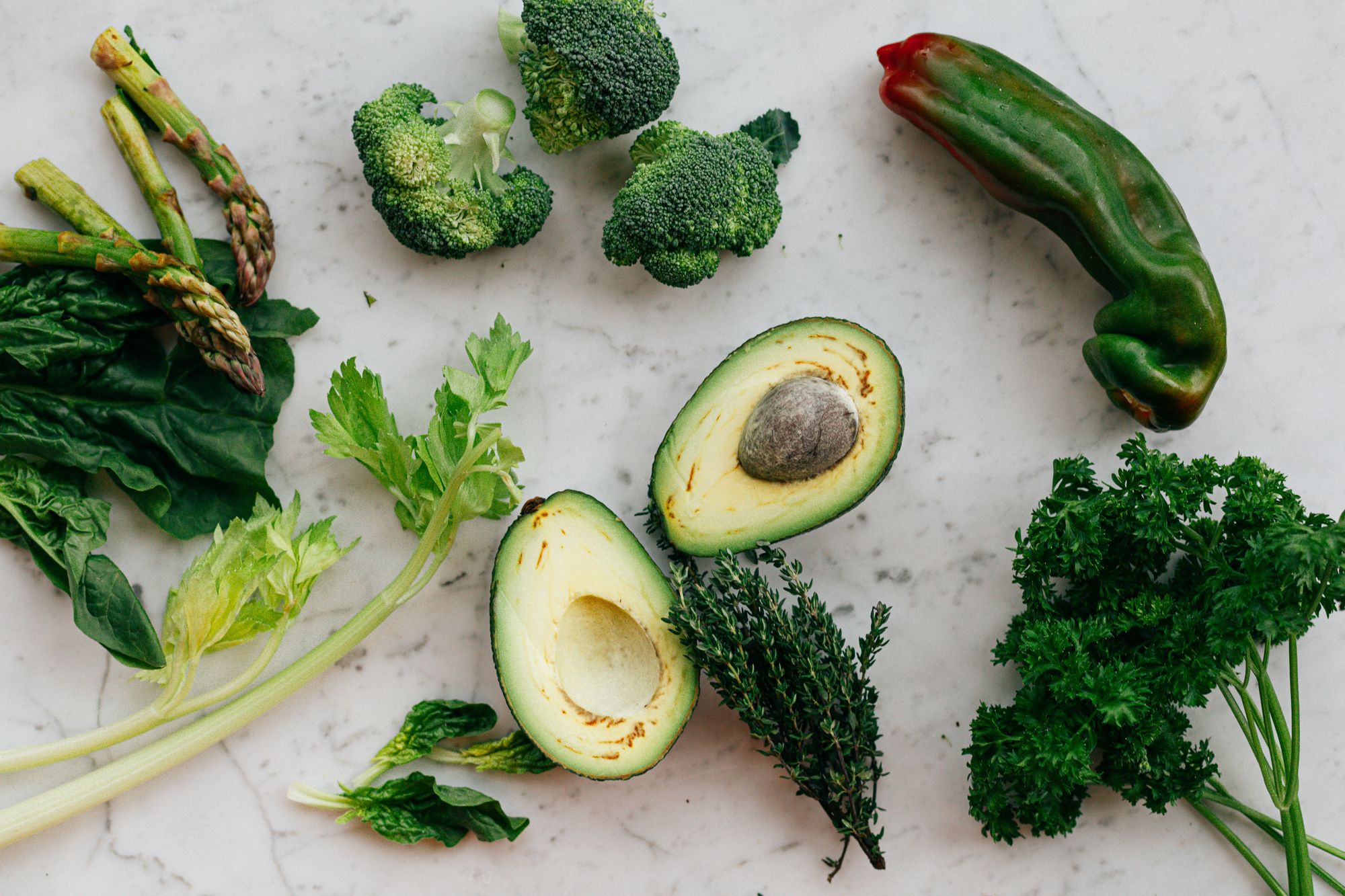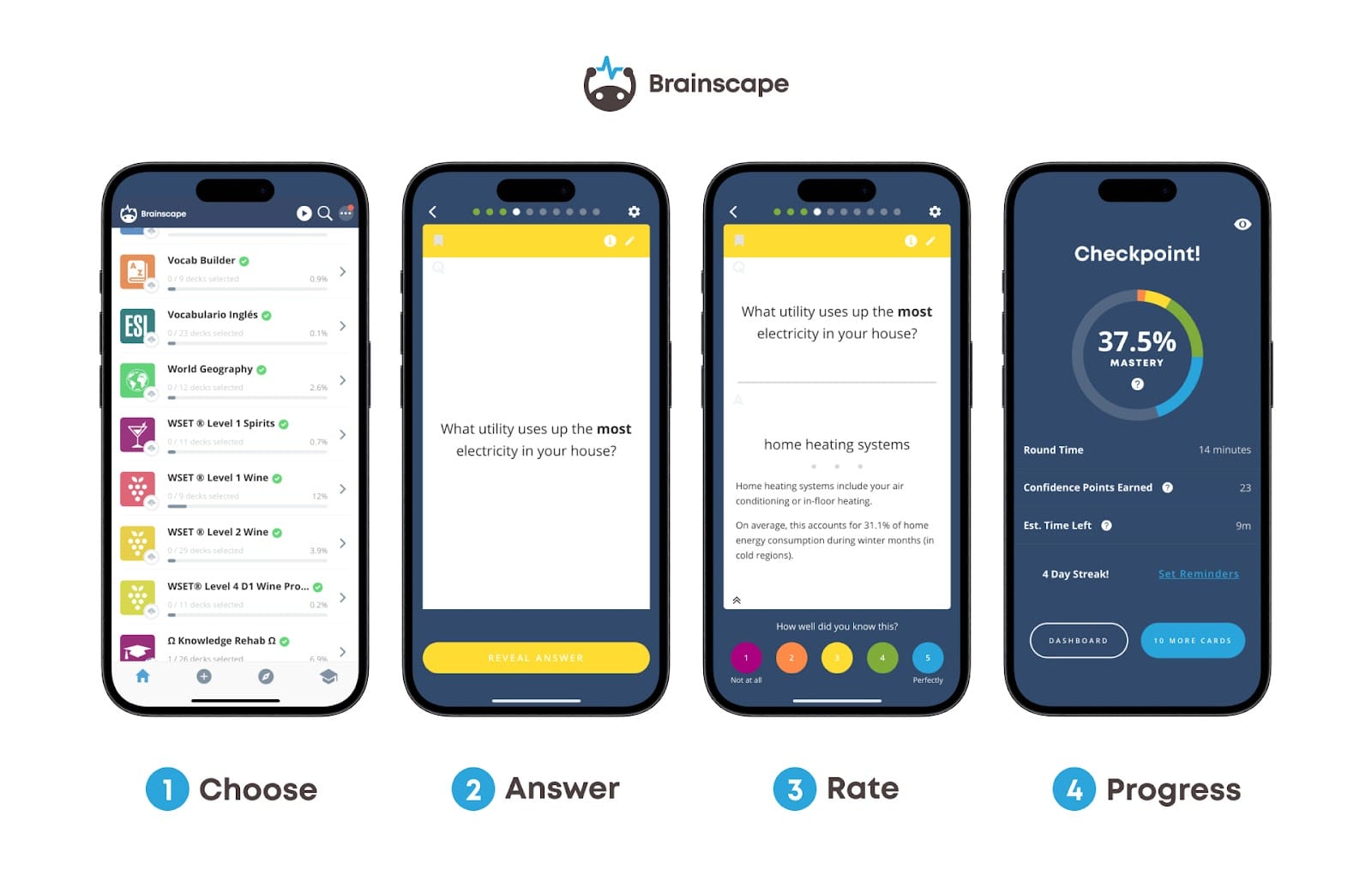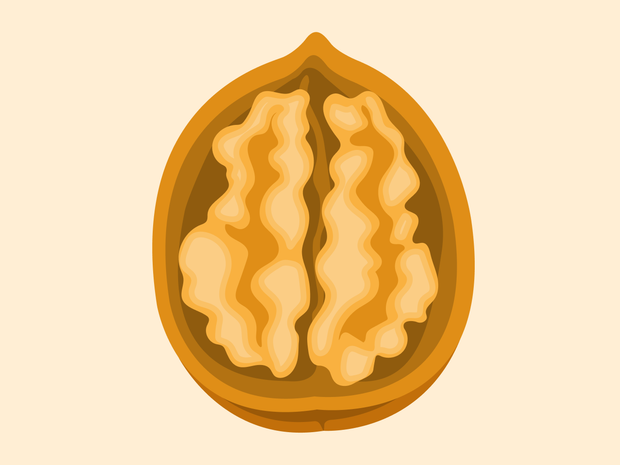It’s test day. Your notes are (mostly) reviewed. Your pencils are sharpened. And your brain? Hopefully not running on fumes and energy drinks. Because as much as we’d all love to believe that a triple-shot espresso and a sad desk donut can carry us through exam day, your brain deserves better. Much better.
The truth is, what you eat before a test has a huge impact on how well you think, focus, and recall information. You wouldn’t show up to a marathon in flip-flops, so why fuel your brain with junk before it’s about to run the cognitive equivalent of 26.2 miles?
At Brainscape, we’re all about smarter study habits—and yes, that includes what you put on your plate. In this guide, we’re serving up the ultimate brain food tips to help you fuel your neurons, boost your focus, and walk into that test feeling sharp, energized, and ready to crush it. Let’s dig in.
The No-Brainer Benefits of a Healthy Diet
We’ve all been there: you eat a big meal, but instead of feeling energized to tackle that mountain of studying, you feel mentally exhausted and fuzzy. You’d far rather take a nap than think. On the opposite end of the spectrum, when you’re hungry—not just peckish but really hangry—it can feel just as hard to focus.
These two circumstances remind us of the fundamental connection between nutrition and brain function. The brain uses glucose to fuel cellular activities. This energy comes from the foods we consume daily. So, when you struggle to focus or feel mentally foggy, your brain is telling you that it needs something, whether that’s proper nutrition, hydration, or sleep.
Eating the right foods doesn’t just make your body feel better—it gives your brain a major boost, too. In the short term, a balanced diet can supercharge your energy, sharpen your memory, and even improve your sleep. Starting the day with a solid breakfast replenishes your brain’s fuel tank, while foods rich in omega-3s and antioxidants (like salmon and spinach) help build the brainpower you’ll need to crush those study sessions. Plus, smart eating throughout the day sets you up for deeper, more restorative sleep—an underrated secret weapon for learning.
Long term, a healthy diet pays off in even bigger ways. Research shows it can improve neurological function, protect against age-related brain shrinkage, and reduce your risk of chronic illnesses that impact both physical and mental health. Translation? What you eat today could help keep your brain sharp for decades to come. So let’s talk about how to turn that science into action with the best brain foods to eat before a big test.
Study Diet Tip 1: Bulk up on Protein
Lean proteins aren’t just great for packing on some muscle and for recovery. They are the building blocks for muscles, bones, hormones, and (you guessed it) the brain. So, the next time you load up a plate for lunch, make sure you’re including various sources of lean protein like white fish, plain Greek yogurt, beans, peas, lentils, skinned poultry, and eggs.
Study Diet Tip 2: Include Healthy Fats
Yes, you need fats in your diet. But there’s an important difference between good and bad fats to keep in mind. Saturated fats predominantly come from animals and are found in fast foods and greasy, fried foods. Consumed in large quantities, this kind of food can literally damage your brain (not to mention give you a heart attack).
Then there are good fats (*insert angels singing*): the omega-3 fatty acids. A 2017 study by Daniel Amen and colleagues found that participants with high levels of omega-3 had increased blood flow to the brain and better cognitive abilities. Fatty fish (think salmon, mackerel, tuna, and herring), nuts (particularly walnuts), seeds, and extra-virgin olive oil are excellent sources of omega-3 fatty acids. You can even take a daily cod liver oil pill for that added brain boost.
Study Diet Tip 3: Our Hero, Antioxidants

“Antioxidants” may just sound like a dietary buzzword, but they are vital for maintaining brain health. Antioxidants, as the name suggests, protect our bodies against oxidative stress from all the crap we are exposed to every day, like pollution, smoke, radiation ... you name it.
You can find antioxidants, our true heroes, in various colorful sources:
- Berries: blueberries, strawberries, and blackberries.
- Dark, leafy vegetables: broccoli, spinach, Swiss chard, and kale contain vitamins K, B6, and B12 for improved alertness and memory.
- Other colorful foods: red grapes, avocados, butternut squash, and plums.
Study Diet Tip 4: Consume Complex Carbohydrates
Your brain’s primary fuel is glucose, which your body derives from carbohydrates and sugar. Complex carbohydrates (wholegrain rice, rolled oats, and whole wheat bread) and low-GI carbohydrates (legumes, fruits, and vegetables) take longer to break down in the body. This provides your brain with a slow and steady drip-feed of glucose.
So don’t demonize carbohydrates. They are a fundamental source of energy that has been given a bad rap by people who would rather resemble a garden rake than a healthy human being. Just make sure you fuel your body with long-lasting carbohydrates (e.g. wholegrain bread, brown rice, rolled oats, quinoa, barley, and corn).
Study Diet Tip 5: Don’t Forget Water
Our brains are essentially 70% water. When they are properly hydrated, they work better. You’ll think faster and focus better with improved clarity. Water removes toxins and delivers nutrients to the brain.
During periods of cognitive loading, such as exam preparation time, it’s important to remember to stay hydrated by drinking plenty of water.
Introducing these healthier brain foods for studying to your diet will give your brain the boost it needs. But it's not just about propelling yourself forward, it's also about removing your barriers to becoming the best learner you can be.
The Worst Foods to Eat Before an Exam
When it comes to fueling your brain before a big test, some foods are definitely off the menu.
First up: sugar bombs and refined carbs. Sure, they give you a quick energy rush, but they’ll leave you crashing and craving snacks mid-study sesh. Greasy, fried foods? Delicious, yes. Good for memory and focus? Not even close.
Then there’s the temptation to try some wild new diet or exotic dish during crunch time—don’t. Now is not the moment for fasting, fermentation experiments, or Peruvian ceviche roulette.
And finally, booze: we love a celebration, but save it for post-exam. Even a “harmless” drink can sabotage your memory, focus, and sleep quality. Keep it simple, keep it smart, and give your brain the fuel it needs to be the star of the test.
FAQ: What Are the Best Brain Foods to Eat Before a Test
What’s the best brain food before an exam?
A winning pre-exam plate includes a mix of lean protein (like eggs or yogurt), healthy fats (like walnuts or avocado), complex carbs (such as oats or wholegrain toast), and a side of antioxidant-rich fruits or veggies. Pair it all with plenty of water to keep your brain firing on all cylinders.
How can I boost my brain before an exam?
Fuel up with a balanced meal about 1–2 hours beforehand. Choose foods that give you lasting energy and enhance focus. Think protein, omega-3s, and slow-digesting carbs. Hydrate well, avoid sugar spikes, and stay away from greasy or unfamiliar foods.
What is the best food to eat before taking a test?
Stick with something familiar and nutritious like a veggie omelet with wholegrain toast, a banana, and a glass of water. It’s light, energizing, and packed with brain-boosting nutrients to keep your mind sharp and steady during the exam.
Feed Your Brain for Test Readiness
So, what’s the secret to feeling like a focused, alert, test-taking machine? It starts on your plate. Fueling your brain with the right balance of protein, healthy fats, complex carbs, antioxidants, and water doesn’t just help you feel more energized—it helps your neurons fire on all cylinders. And let’s be honest: your brain works hard for you. The least you can do is give it something better than sugar bombs, greasy burgers, and a questionable energy drink from the back of your fridge.
The bottom line? If you want to show up to your exam feeling sharp, confident, and mentally clear, plan your meals the way you plan your study sessions (or at least how you wish you planned them).
Brainscape is a web and mobile study app that helps you learn more in less time using adaptive flashcards. Here’s how it works: You rate how well you know each flashcard on a scale from 1 to 5, and Brainscape’s algorithm schedules the cards you struggle with to reappear more frequently, while spacing out the ones you’ve already mastered. This technique, called spaced repetition, is scientifically proven to double memory retention.

You can study with Brainscape’s library of certified flashcard collections created by experts—or make your own decks for any subject under the sun. It’s like having a personalized tutor in your pocket, 24/7.
Pair that with brain-friendly fuel, and you’ll be unstoppable. Your flashcards—and your breakfast—have your back.
Additional Reading
- Optimize Your Brain Health for Effective Studying
- Does sugar help or hurt your studying?
- The 20 best test-taking strategies used by top students
Sources
Amen, D. G., Harris, W. S., Kidd, P. M., Meysami, S., & Raji, C. A. (2017). Quantitative erythrocyte omega-3 EPA plus DHA levels are related to higher regional cerebral blood flow on brain SPECT. Journal of Alzheimer's Disease, 58(4), 1189-1199. https://doi.org/10.3233/jad-170281
Chacón-Cuberos, R., Zurita-Ortega, F., Martínez-Martínez, A., Olmedo-Moreno, E. M., & Castro-Sánchez, M. (2018). Adherence to the Mediterranean diet is related to healthy habits, learning processes, and academic achievement in adolescents: A cross-sectional study. Nutrients, 10(11), 1566. https://doi.org/10.3390/nu10111566
Krabbe, K., Nielsen, A. R., Krogh-Madsen, R., Plomgaard, P., Rasmussen, P., Erikstrup, C., ... & Secher, N. H. (2007). Brain-derived neurotrophic factor (BDNF) and type 2 diabetes. Diabetologia, 50(2), 431-438. https://doi.org/10.1007/s00125-006-0537-4
Ozawa, M., Shipley, M., Kivimaki, M., Singh-Manoux, A., & Brunner, E. J. (2017). Dietary pattern, inflammation and cognitive decline: The Whitehall II prospective cohort study. Clinical Nutrition, 36(2), 506-512. https://doi.org/10.1016/j.clnu.2016.01.013
